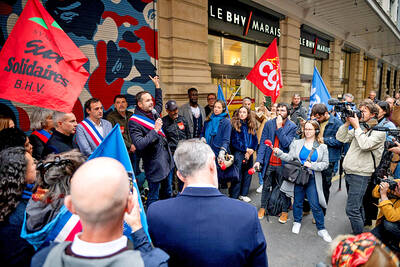Acer Inc (宏碁), the world’s third-largest personal computer (PC) vendor, yesterday vowed to become the world’s No. 1 by 2011 as it continues innovations focusing on the notebook arena.
The company also unveiled the latest addition to its netbook family: the Aspire One 10.1-inch edition.
Scott Lin (林顯郎), president of Acer’s Taiwan operations, said he had high hopes for the low-priced netbook market, forecasting that aggregate global shipments from all vendors could reach 25 million to 30 million units this year and rise to 40 million units next year.
“In dollar terms, we’re talking about an estimated NT$500 billion [US$14.45 billion] global netbook market,” Lin said.
Without disclosing Acer’s netbook forecast for this year, Lin said the competition would be extremely tough this year as Hewlett-Packard Co (HP), Dell Inc and Lenovo Group Ltd (聯想) enter the market.
In an interview with the Wall Street Journal yesterday, Acer chairman J.T. Wang (王振堂) said netbooks now account for about 30 percent of Acer’s notebook sales, adding that Acer expects global sales of the mininotebooks to reach between 25 million and 35 million units next year, or 15 percent to 20 percent of its total computer sales.
Despite its initial success with the Aspire One 8.9-inch model, Acer said it was in no hurry to introduce its 10.1-inch version — which was launched one month late.
“The reason for the one-month delay is because we wanted to make sure all the top components are ready in this new model, from panel to battery and computer processing unit,” Lin said.
The new Aspire One 10.1-inch model retails at NT$17,200, while the company hopes to push down the price of the 8.9-inch model to around NT$11,800.
Lin said the new Aspire One model employs liquid-crystal-display panels produced by fifth-generation LCD fabs and are brighter and more saturated than Asustek Computer Inc’s (華碩電腦) S101 10.2-inch netbook, which uses LCDs produced by a 3G fab.
Acer’s panel providers are AU Optronics Corp (友達光電) and Samsung Electronics Co, Lin said.

Taiwan’s rapidly aging population is fueling a sharp increase in homes occupied solely by elderly people, a trend that is reshaping the nation’s housing market and social fabric, real-estate brokers said yesterday. About 850,000 residences were occupied by elderly people in the first quarter, including 655,000 that housed only one resident, the Ministry of the Interior said. The figures have nearly doubled from a decade earlier, Great Home Realty Co (大家房屋) said, as people aged 65 and older now make up 20.8 percent of the population. “The so-called silver tsunami represents more than just a demographic shift — it could fundamentally redefine the

Businesses across the global semiconductor supply chain are bracing themselves for disruptions from an escalating trade war, after China imposed curbs on rare earth mineral exports and the US responded with additional tariffs and restrictions on software sales to the Asian nation. China’s restrictions, the most targeted move yet to limit supplies of rare earth materials, represent the first major attempt by Beijing to exercise long-arm jurisdiction over foreign companies to target the semiconductor industry, threatening to stall the chips powering the artificial intelligence (AI) boom. They prompted US President Donald Trump on Friday to announce that he would impose an additional

China Airlines Ltd (CAL, 中華航空) said it expects peak season effects in the fourth quarter to continue to boost demand for passenger flights and cargo services, after reporting its second-highest-ever September sales on Monday. The carrier said it posted NT$15.88 billion (US$517 million) in consolidated sales last month, trailing only September last year’s NT$16.01 billion. Last month, CAL generated NT$8.77 billion from its passenger flights and NT$5.37 billion from cargo services, it said. In the first nine months of this year, the carrier posted NT$154.93 billion in cumulative sales, up 2.62 percent from a year earlier, marking the second-highest level for the January-September

Asian e-commerce giant Shein’s (希音) decision to set up shop in a historic Parisian department store has ruffled feathers in the fashion capital. Anger has been boiling since Shein announced last week that it would open its first permanent physical store next month at BHV Marais, an iconic building that has stood across from Paris City Hall since 1856. The move prompted some French brands to announce they would leave BHV Marais, but the department store had already been losing tenants over late payments. Aime cosmetics line cofounder Mathilde Lacombe, whose brand was among those that decided to leave following